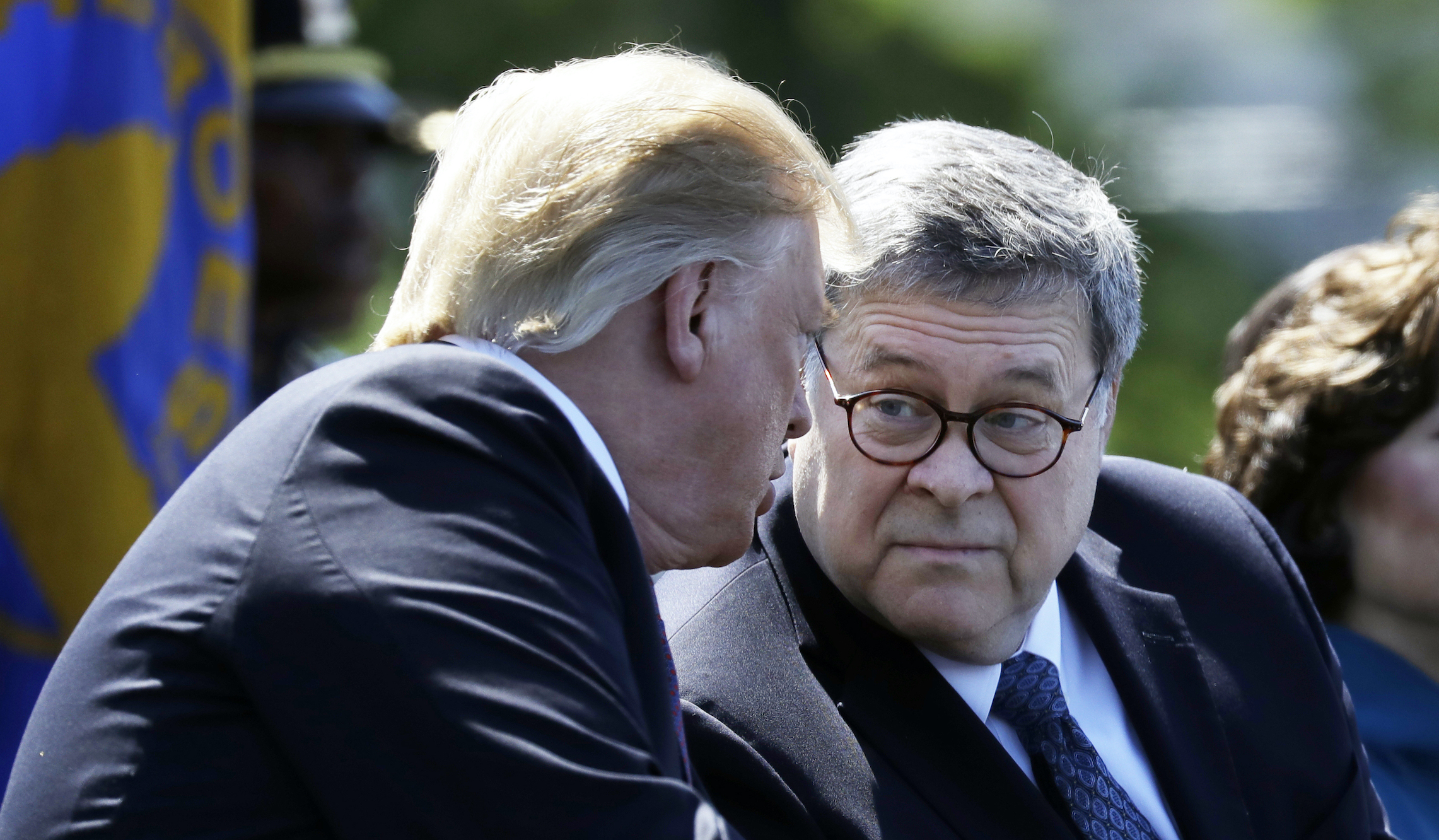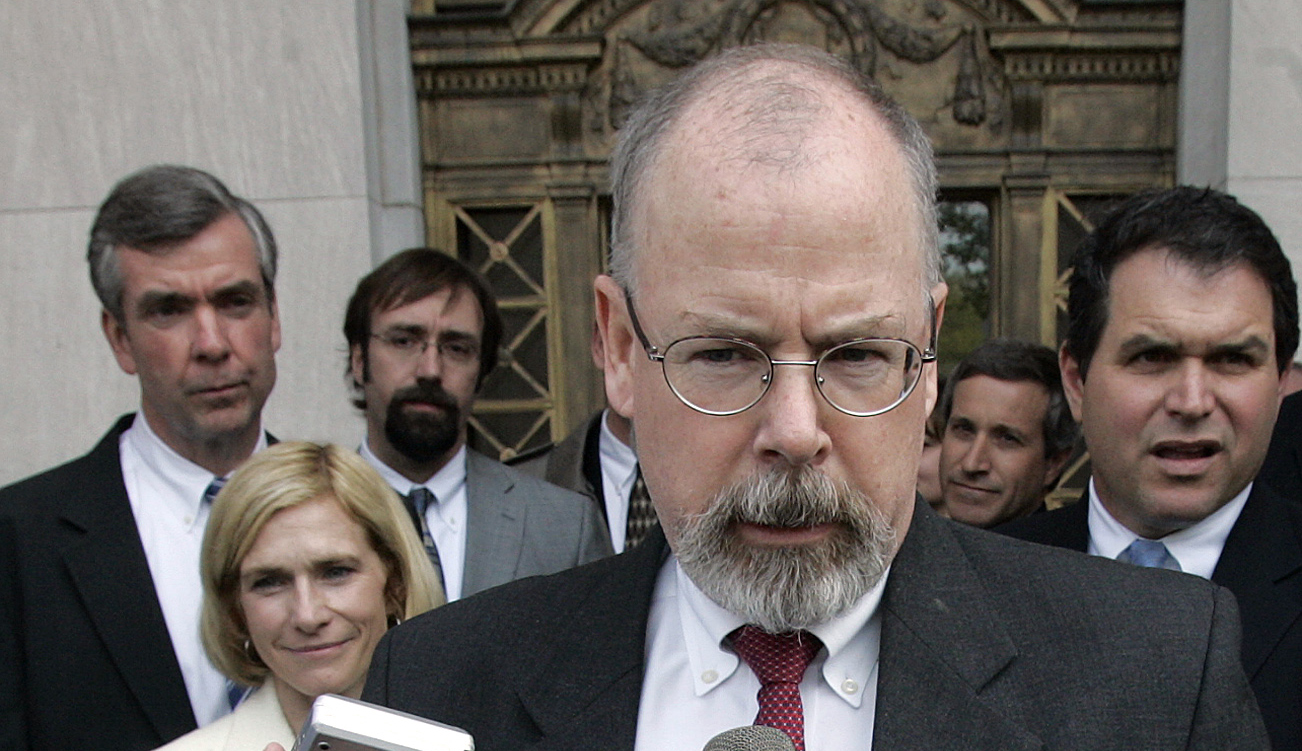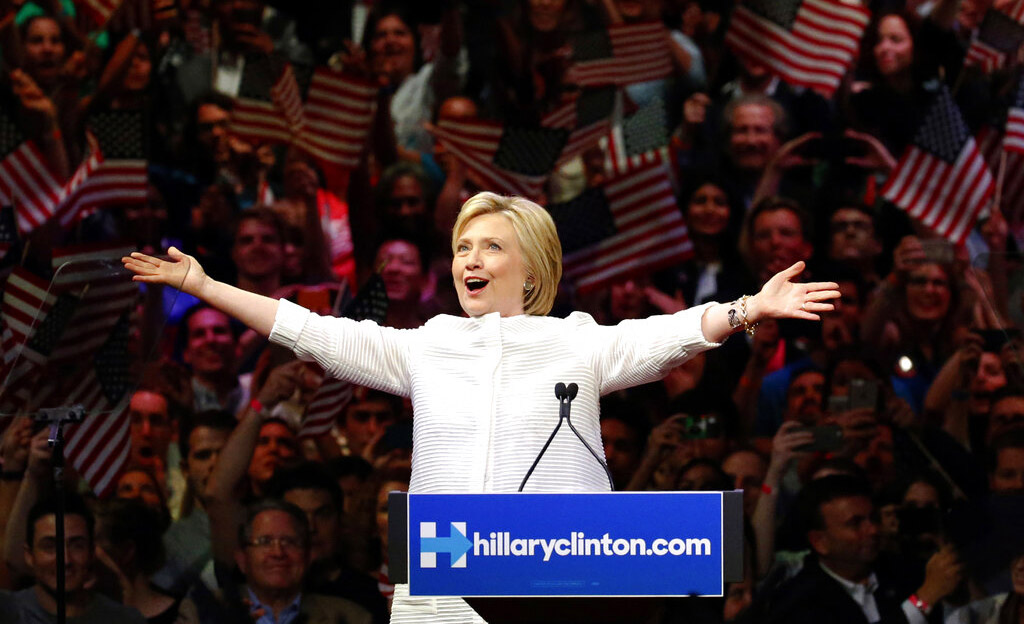William Barr confronted a top White House aide over concerns that President Donald Trump wanted to “blow up” special counsel John Durham‘s criminal inquiry into the Russia investigation after the 2020 election, the former attorney general wrote in his new book.
As Barr would tell it in One Damn Thing After Another, the day it was revealed in December that he had elevated Durham, who at the time was the U.S. attorney for the District of Connecticut, to special counsel status with extra protections, Barr had a startling realization. This came after White House chief of staff Mark Meadows informed Barr that Trump was upset the attorney general had told the Associated Press that the Justice Department did not find any evidence to support the president’s claims of widespread fraud in the 2020 election.
“Then it hit me,” Barr wrote. “The President didn’t want to wait to have Durham’s findings out after January 20. I thought his aim might be to push aside Durham and then have his own legal team — a farcical collection akin to his election team, I guessed — rifle through Durham’s materials and publish right away whatever documents helped Trump. It wasn’t clear to me whether he wanted to get this stuff out to support his efforts to stay in office, or whether he simply did not trust that it would get out after he left office.”
Barr said he pressed Meadows on why Trump would “want to blow up the Durham investigation,” according to the Washington Post. In Barr’s recollection, Meadows replied, “Sorry, Bill. I don’t know what the President will do, but he might decide not to wait any longer.”
“Well,” Barr wrote, recalling his response, “under the department’s regulations, he can only be removed by me. And I won’t do it.” Barr claimed Trump wanted him “to deliver scalps in time for the election.”

Barr resigned from his post just before Christmas. This ended his second stint as attorney general. The first was during the administration of President George H. W. Bush. Trump has since called him a “disappointment in every sense of the word” while citing the Russia investigation.
The memoir is due to be published March 8, but it is already generating headlines, in particular for Barr’s reported assessment that Trump running for president again is “dismaying” and imploring the Republican Party to “look forward” to other candidates.
Barr, who was brought into the Trump administration in February 2019 and oversaw the release of Robert Mueller’s special counsel report on the Russia investigation, wrote that his relationship with Trump was “fraying” by the end of summer 2020, in no small part because of the president’s impatience with the pace of Durham’s review of what the president has long called the Russia “witch hunt.”
Barr wrote that he told Trump that Durham’s examination of the CIA’s role in the matter, which stretched into 2019, did “not pan out,” according to the Washington Post. “You buy that bulls***, Bill?” Trump retorted.
DURHAM ADDS TO SPYGATE’S CHAPTER ON TRUMP TRANSITION
The former attorney wrote that he “lost it” and replied sarcastically, “Well, if you know what happened, Mr. President, I am all ears. Maybe we are wasting time doing an investigation. Maybe all the armchair quarterbacks telling you they have all the evidence can come in and enlighten us.”
More than a year into the Biden administration, Durham’s investigation remains alive, with two active prosecutions playing out in the public sphere.
Michael Sussmann, a Democratic cybersecurity lawyer, was indicted last year for allegedly concealing his clients, including Hillary Clinton’s 2016 presidential campaign, from the FBI in September 2016 when he shared debunked claims of a secret backchannel between the Trump Organization and Russia’s Alfa Bank. Igor Danchenko, a U.S.-based and Russia-born researcher, was charged by Durham with five counts of making false statements to the FBI about the information he provided to British ex-spy Christopher Steele for his discredited dossier. Both defendants have pleaded not guilty.
Durham also obtained a guilty plea from former FBI lawyer Kevin Clinesmith, who admitted to altering fraudulently an email about a Trump campaign aide under government surveillance.
A Justice Department official said in July that the agency “agrees” with Barr’s October 2020 special counsel order, which stated that “in addition to the confidential report” Durham was required to submit to the Justice Department, “the Special Counsel, to the maximum extent possible and consistent with the law and policies and practices of the Department of Justice, shall submit to the Attorney General a final report, and such interim reports as he deems appropriate, in a form that will permit public dissemination.”

Barr also wrote that Trump was angry when the Justice Department declined to prosecute fired FBI Director James Comey after there were a “few words” of classified information in his so-called Comey Memos. “I’m shocked, Bill. I’m disgusted. I’m not happy about this, Bill,” Trump said, according to the book. Trump “never let me forget how unhappy he was,” Barr wrote.
Michael Horowitz, the inspector general of the Justice Department, issued a report in August 2019 on Comey’s mishandling of his memos and showed that the former FBI director’s one-on-one briefing with Trump was treated as a chance to gather information for the FBI’s Trump-Russia investigation. The first of seven Comey Memos was written that day. Horowitz criticized Comey over the leak of his memos to the press, saying Comey orchestrated their dissemination to advance his own interests and spark the appointment of a special counsel. Trump fired Comey on May 9, 2017, and Mueller was appointed as special counsel to take over the Russia investigation a week later.
In addition, Barr wrote that Trump told him the investigation into Clinton’s unauthorized use of a private email server during her time as secretary of state “should be dropped,” noting that “even if she were guilty … for the election winner to seek prosecution of the loser would make the country look like a banana republic.”
“Lock her up!” chants were pervasive at Trump rallies in 2016. Trump famously told Clinton that “you’d be in jail” if he were president during one of their debates.
Clinton’s email practices were investigated by the FBI. Comey announced in the summer of 2016 that Clinton was “extremely careless” in handling classified emails but recommended no criminal charges. The Clinton email investigation was reopened upon the discovery of a new batch of emails in late October 2016, but it was closed again, with no new conclusions, days before the election.
A State Department review of email practices of dozens of former agency officials and aides to Clinton found “some instances” of classified information being “inappropriately introduced into an unclassified system.” But investigators uncovered “no persuasive evidence of systematic, deliberate mishandling of classified information.”

In their book Peril, Watergate sleuth Bob Woodward and fellow journalist Robert Costa wrote about how Barr braced himself in the face of unprecedented fury displayed by Trump when he was told Durham would likely not finish the criminal inquiry into the Russia investigation until sometime during the incoming Biden administration. The “investigation into the investigators” had become another sore subject for Trump because of the lack of public developments before the November contest.
During a White House meeting in early December, Barr told Trump he did not know when Durham might finish, as the investigation ran at its own pace depending on the evidence. Still, he posited, “I would imagine it would be in the first part of the Biden administration, hopefully maybe in the first six months.”
CLICK HERE TO READ MORE FROM THE WASHINGTON EXAMINER
This prompted Trump to shout. “First part of the Biden administration!” he roared.
“‘Oh, s***,’ Barr thought,” according to the book. “Trump was steaming. Barr had never seen Trump in such a fury. If a human being can have flames come out of his ears, this was it. Barr imagined the flames. He had never seen Trump madder. But Trump was obviously trying to control himself. Tamping himself down and then flaming.”
Earlier this month, Trump lamented how he wished Durham’s investigation had moved “faster.” He maintained that “it would’ve been nice to have been done before the election” because “what they did was so criminal, and it would’ve been good if the voters had known that.” Still, Trump said he did not think the lack of a report was a “big defining moment” for the 2020 contest in which he lost to President Joe Biden. Trump also predicted there were likely “very big things to come” from Durham.


